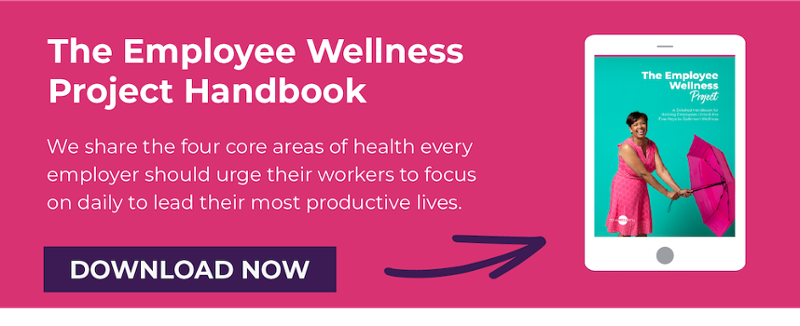 Money issues are stressing your employees out.
Money issues are stressing your employees out.
A recent survey found that above all other issues — relationships, work, even health concerns — money matters were the most overwhelming to handle.
Even with a stable economy, PwC’s 8th annual Employee Financial Wellness Survey revealed that employees feel cash strapped and debt-heavy. Few employees surveyed felt that their pay was keeping up with the cost of living increases.
The survey also found:
- Most felt they’d be working into retirement
- Student loans are a financial wellness hinderance
- Caring for both parents and kids is costing them
Below, we dig into the survey findings and offer financial wellness tips for employers to help employees improve their financial well-being.
What is Financial Wellness?
Financial wellness is having a good state of mind about the ability to manage finances, financial responsibilities, and future financial status.
In a nutshell, it’s the ability to pay day-to-day expenses, monthly and annual bills, building emergency savings, saving for specific events like vacations or weddings, and planning for the future like college and retirement.
Basically, it’s all of the ways people deal with money that impacts their level of financial “health.”
The Status of Employees and Their Financial Wellness
PwC’s 8th annual Employee Financial Wellness Survey reveals that full-time employees are more stressed about money than ever, even though the economy is strong. Even though the jobless rate is at a 49-year low, employees are still worried. The study included the viewpoints of 1,686 full-time employed adults.
In your own workplace, employees may be feeling the same pressure.
So how do you help them? By incorporating financial wellness as part of your overall wellness program strategy. This can be beneficial for employees and the company as a whole.
Stress from being financially unhealthy can lead to distracted employees, higher levels of absenteeism, lower productivity, delayed retirement, and higher healthcare costs.
According to the study:
- 59% of employees reported financial matters are the #1 cause of stress
- 49% of employees surveyed said that they regularly have a difficult time meeting their monthly household financial obligations
- Only 18% of employees think they won’t need to work during retirement
- 50% think they will work part-time during retirement
- 32% will need to continue to work full-time into retirement
Interestingly enough, most employees want help with their finances. It’s no longer an off-limits topic that employees want to always keep quiet about. A select few hesitate, though.
The study found:
- Only 12% of employees reported they didn’t want any personal finance help
- 31% want specific advice
- 57% want to make decisions, but have them validated by experts
When asked, “What would most help you achieve your future financial goals?” respondents differed depending on their generation. Millennial and Gen X employees both felt job security was most important while Baby Boomers’ priorities were between rising stock markets and affordable healthcare.
What Can Employers Do to Help?
Employees who are financially healthy are not only happier and healthier, they are better for the company’s bottom line. Bringing financial wellness education into the workplace can make all the difference. Make financial wellness programs a priority and regularly provide financial wellness tips in newsletters, flyers, and other communications.
Other tips that can build your financial wellness program:
- Survey - Ask your employees via a confidential survey what they’re struggling with to determine where they need the most help. Ask if they can pay their bills, have savings, want to invest in a 401k, etc.
- Make sure your human resources department is connected - Ensure HR and employees understand the benefits your company offers. Don’t let HR get away with just handing over folders to new hires. Encourage them to sit down with them and go over specific perks.
- Have open Q-and-A sessions - These can be great for employees who want to know more. You can open up the floor to discuss healthcare and HSAs or retirement benefits contributions and how to make the most of them. Be sure to cover additional health benefits like cancer policies or caregiver benefits.
- Remind employees to use their days off - Send out quarterly personalized emails to individuals to let them know about their saved up PTO and “mental health days.” Or, remind them that they can take “last-minute days off” if your company offers them.
- Share banking perks - Educate employees on benefits such as savings and loan relationships your company may have that are extended to employees.
- Show them where they can save - If you offer unique wellness benefits — like discounts on gym memberships, local events, shopping discounts — don’t let your employees forget. Don’t let these be hush-hush perks! Anything the company offers that will help reduce costs and stress for the employee can help financial wellness.
- Have open communication - Keep employees informed of changes in retirement plans, health care costs, and any other policy changes that may affect their paycheck or retirement funds. An advanced notice can help them plan accordingly.
- Provide external resources - Explore local or provide one-on-one financial counseling resources for employees.
- Host lunch and learns - Bring the experts into your workplace who teach savings techniques, explore how to save for college/find scholarships, and how to maximize tax deductions.
- Help with goal setting - Consider hosting quarterly financial “check-up” or “check-in” programs to help employees set and meet their personal financial goals. These can be in-house meetings if you have the talent, an online program, or schedule an outside expert to assist.
A Few Final Financial Wellness Tips to Share With Employees
We hope you found these financial wellness tips helpful! Adding a personal finances arm to your wellness program can have a domino effect on your employees’ lives in a positive way.
Once they feel they have a grip on money management, other areas of their personal and professional lives can feel a lot smoother. It only takes one piece of knowledge to help them transform their finances and continue thirsting for more financial personal development.
If you’re not sure where to start, here are a few more ideas:
- Start with an intro class - Gather interest with a simple workshop on “What is Financial Wellness?” or “What’s Your Financial Wellness IQ?” to gauge interest.
- Remember it’s a lifestyle change - Financial wellness is more than a buzzword. It’s a way of living that provides freedom and comfort — much like exercise and dieting!
- It’s good for the company - Financially healthy employees are better for the company and the overall economy. Start small and grow your personal finance wellness programs as interest throughout the company spreads.
- Make it personal - Most employees want personalized advice. Taking the steps to provide this shows the company’s investment in the employee.
Last but not least, make it comfortable. Find ways to create playful learning opportunities to break the taboo topic of money discussions. It can minimize the shame surrounding lack of financial wellness so your wellness program can start healing the money “health” issues employees may have.
How have you incorporated financial wellness into your wellness programs? We’d love to hear your ideas in the comments below! Don’t forget to check out our post Why Employee Money Illness is Making Your Company Sick.



